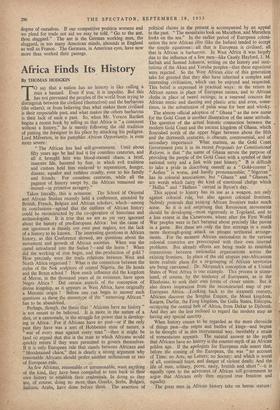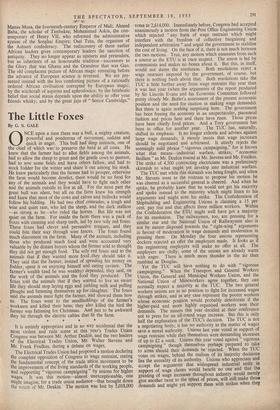Africa Finds Its History
By THOMAS HODGKIN TO say that a nation has no history is like calling a man a bastard. Even if true, it is impolite. But this has not prevented the peoples of the world from trying to distinguish between the civilised (themselves) and the barbarous (the others); or from believing that what makes them civilised is their respectable past, and what makes the others barbarous is their lack of such a past. So, when Mr. Vernon Bartlett begins a recent book by telling us that Africa is " a continent without a history," he is merely following the old tradition of putting the foreigner in his place by attacking his pedigree. Lord Milverton, in his pamphlet African Opportunity, is even more severe : " The African has had self-government. Until about fifty years. ago he had had it for countless centuries, and all it brought him was blood-stained chaos, a brief, insecure life, haunted by fear, in which evil tradition and custom held him enslaved to superstition, hunger, disease, squalor and ruthless cruelty, even to his family and friends. For countless centuries, while all the pageant of history swept by, the African remained un- moved—in primitive savagery."
Taken literally, this is nonsense. The School of Oriental and African Studies recently held a conference, attended by British, French, Belgian and African scholars, which—among its conclusions—agreed that the outlines of African history could be reconstructed by the co-operation of historians and archaeologists. It is true that we are as yet very ignorant about the history of pre-European Africa : but the cause of our ignorance is mainly our own past neglect, not the lack of a history to be known. The interesting questions in African history, as this Conference showed, are questions about the movement and growth of African societies. When was the camel introduced into the Sudan ?—and the horse ? When did the working of iron begin, and the-production of gold ? How precisely were the trade relations between West and North Africa organised ? What is the connection between the styles of the Nok sculpture of central Nigeria, the Ife heads and the Benin school ? How much influence did the kingdom of Meroe, in the thousand years of its existence, have upon Negro Africa ? Did certain aspects of the conception of divine kingship, as it appears in West Africa, have originally. a Meroitic origin ? Before one can begin to answer such questions as these the stereotype of the " unmoving African " has to be abandoned.
Perhaps, though, the thesis that " Africans have no history " is not meant to be believed. It is more in the nature of a shot, or a cannonade, in the struggle for power that is develop- ing in Africa. For if Africans have no past—or if the only past they have was a sort of Hobbesian state of nature, a " war of every man against every man "—then it might be (and is) argued that this is the state to which Africans would quickly return if they were permitted to govern themselves. If it is only European rule that stands between Africans and " bloodstained chaos," that is clearly a strong argument why reasonable Africans should prefer another millennium or two of European rule. As few Africans, reasonable or unreasonable, want anything of the kind, they have been compelled to turn back to their own history to establish their crqdentials. In doing so they are, of course, doing no more than Greeks, Serbs, Bulgars, Indians, Arabs, have done before them. The assertion of political claims in the present is accompanied by an appeal to the past. " The mountains look on Marathon, and Marathon looks on the sea." In the earlier period of European coloni- sation the new African elite (like the Indian) tended to accept the simple equations:. all that is European is civilised; all that is African is barbarous. In West Africa it was largely due to the influence of a few ,men—like Casely Hayford, J. M. Sarbah and Samuel Johnson, writing on the history and insti- tutions of the Akan and Yoruba peoples—that these equations were rejected. So the West African elite of this generation take for granted that they also have inherited a complex and interesting civilisation, which can be enjoyed and respeCted. This belief is expressed in practical ways: in the return to African names in place of European names, and to African cloths in place of tweed suitings; in a renewed concern for African music and dancing and plastic arts; and even, some- times, in the substitution of palm wine for beer and whisky.
The almost official adoption of " Ghana " as the new name for the Gold Coast is another illustration of the same attitude. The question of the actual historic connection between the modern Gold Coast and the ancient kingdom of Ghana, which flourished north of the upper Niger between about the fifth and the thirteenth centuries, is obscure, controversial, and of secondary importance. What matters, as the Gold Coast Government puts it in its recent Proposals for Constitutional Reform, is that " the name of Ghana serves the purpose of providing the people of the Gold Coast with a symbol of their national unity and a link with past history." It is difficult to take a pride in describing oneself as a " Gold-coaster "; " Aofien " is worse, and hardly pronounceable; " Nigerian " has its colonial associations; but Ghana " and " Ghanan " are words which carry the kind of emotional chatge which " Hellas " and " Hellene " carried in Byron's day. This appeal to history has its use as a weapon, not only against colonial rule, but also against colonial frontiers. Nobody pretends that existing African frontiers make much sense. So it is not surprising that Revisionist movements should be developing—most vigorously in Togoland, and to a less extent in the Cameroons, where after the First World War peoples were in fact bartered about precisely like pawns in a game. But these are only the first stirrings in a much more thorough-going attack on present territorial arrange- ments. For the moment African nationalists in the various colonial countries are preoccupied with their own internal problems. But already efforts are being made to, establish connections between nationalist organisations across the existing frontiers. In place of the old utopian pan-Africanism more realistic plans for a re-grouping of African territories are being canvassed. Dr. Nkrumah's conception of a United States of West Africa is one example. This process is stimu- lated, of course, by the tendency of Europeans, as in the Rhodesias, to seek their own forms of closer union. But it also draws inspiration from the reconstructed map of pre- European Africa. .Looking back to the sixteenth century, Africans discover the Songhai Empire, the Mossi kingdom, Kanem, Darfur, the Fung kingdom, the Galla States, Ethiopia, occupying the central belt of Africa, from Dakar to Djibouti. And they are the less inclined to regard the modern map as having any special sanctity.
When history ceases to be regarded as the mere chronicle of things past—the reigns and battles of kings—and begins to be thought of in this instrumental way, inevitably a strain of romanticism appears. The natural answer to the myth that Africans have no history is the counter-myth of an African golden age. If the apologists for European rule assert that, before the coming of the European, the was " no account of Time; no Arts; no Letters; no Society; and which is worst of all, continuall feare, and danger of violent death; And the life of man, solitary, poore, nasty, brutish and short "—it is equally open to the advocates of African self-government to argue that Africans only then enjoyed true freedom and equality. The great men in African history take on heroic stature : Mansa Musa, the fourteenth-century Emperor of Mali; Ahmed Baba, the scholar of Timbuktu; Mohammad Askia, the con- temporary of Henry VII, who reformed the administrative system of the Songhai Empire; Osei Tutu, the organiser of the Ashanti confederacy. The rediscovery of these earlier African leaders gives contemporary leaders the sanction of antiquity. They no longer appear as upstarts and pretenders, but as inheritors of an honourable tradition—successors to the Glory that was Ghana and the Grandeur that was Gao. The old complacent picture of African magic retreating before the advance of European science is reversed. We are pre- sented instead with the less comforting picture of a rationally ordered African civilisation corrupted by European magic; by the witchcraft of aspirins and aphrodisiacs; by the fetishistic belief that social status depends upon the ability to offer your friends whisky; and by the great juju of " Senior Cambridge."



































 Previous page
Previous page